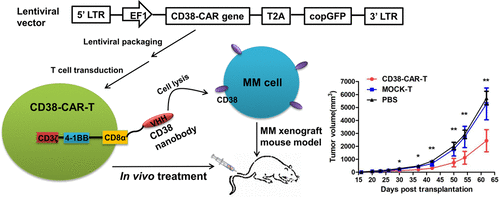当前位置:
X-MOL 学术
›
Mol. Pharmaceutics
›
论文详情
Our official English website, www.x-mol.net, welcomes your feedback! (Note: you will need to create a separate account there.)
Anti-Multiple Myeloma Activity of Nanobody-Based Anti-CD38 Chimeric Antigen Receptor T Cells
Molecular Pharmaceutics ( IF 4.9 ) Pub Date : 2018-09-05 00:00:00 , DOI: 10.1021/acs.molpharmaceut.8b00584 Na An 1 , Yun Nan Hou 2 , Qiao Xia Zhang 1 , Ting Li 2 , Qiong Li Zhang 1 , Cheng Fang 2 , Huan Chen 1 , Hon Cheung Lee 2 , Yong Juan Zhao 2 , Xin Du 1
Molecular Pharmaceutics ( IF 4.9 ) Pub Date : 2018-09-05 00:00:00 , DOI: 10.1021/acs.molpharmaceut.8b00584 Na An 1 , Yun Nan Hou 2 , Qiao Xia Zhang 1 , Ting Li 2 , Qiong Li Zhang 1 , Cheng Fang 2 , Huan Chen 1 , Hon Cheung Lee 2 , Yong Juan Zhao 2 , Xin Du 1
Affiliation

|
Chimeric antigen receptor T cells (CAR-Ts) are a promising strategy for the treatment of many cancers, including multiple myeloma (MM), a hematological malignancy characterized by the high expression of CD38. To broaden the applications of using CD38 as a therapeutic target for the disease, we developed a new nanobody against CD38 and constructed a CD38-CAR that was composed of this nanobody as the targeting domain, and 4-1BB and CD3ζ as the costimulatory and activating domains, in a lentiviral vector. CD3+ T cells from healthy individuals were transduced with the CD38-CAR at an efficiency higher than 60%, as determined by CD38-CAR expression using flow cytometry. The CD38-CAR-Ts proliferated efficiently and produced more inflammatory cytokines, such as IL-2, IFN-γ, and TNF-α, when activated. The CD38-CAR-Ts effectively lysed CD38+ MM cell lines, including LP-1, RPMI 8226, OPM2, and MOLP8, and primary MM cells from multiple myeloma patients. The specificity was demonstrated by the fact that CD38-CAR-Ts showed little cytotoxicity on LP-1 cells with CD38 knocked out or on K562 cells, which do not express CD38. CD38-CAR-Ts appeared to have a very slight cytotoxicity against CD38+ fractions of T cells, B cells, and natural killer cells. In addition, the lysis of CD34+ hematopoietic progenitor cells did not completely inhibit the development of colony-forming units. In vivo, CD38-CAR-Ts inhibited tumor growth in NOD/SCID mice that were subcutaneously inoculated with RPMI 8226 cells. These results demonstrate that the CD38-CAR-Ts constructed with the anti-CD38 nanobody are a promising approach for the treatment of multiple myeloma.
中文翻译:

基于纳米抗体的抗CD38嵌合抗原受体T细胞的多发性骨髓瘤活性。
嵌合抗原受体T细胞(CAR-Ts)是治疗许多癌症的有前途的策略,包括多发性骨髓瘤(MM),一种以CD38高表达为特征的血液系统恶性肿瘤。为了拓宽使用CD38作为该疾病治疗靶标的应用范围,我们开发了一种针对CD38的新型纳米抗体,并构建了以该纳米抗体为靶向结构域,4-1BB和CD3ζ作为共刺激和激活成分的CD38-CAR域,在慢病毒载体中。CD3 +使用流式细胞术通过CD38-CAR表达确定,以高于60%的效率用CD38-CAR转导健康个体的T细胞。当激活时,CD38-CAR-Ts有效增殖并产生更多的炎性细胞因子,例如IL-2,IFN-γ和TNF-α。CD38-CAR-T可有效裂解CD38 + MM细胞系,包括多发性骨髓瘤患者的LP-1,RPMI 8226,OPM2和MOLP8,以及原代MM细胞。CD38-CAR-Ts对敲除CD38的LP-1细胞或不表达CD38的K562细胞几乎没有细胞毒性的事实证明了特异性。CD38-CAR-Ts似乎对T细胞,B细胞和自然杀伤细胞的CD38 +部分具有非常轻微的细胞毒性。此外,CD34 +的裂解造血祖细胞并未完全抑制集落形成单位的发育。在体内,CD38-CAR-Ts抑制了皮下接种RPMI 8226细胞的NOD / SCID小鼠的肿瘤生长。这些结果表明,用抗CD38纳米抗体构建的CD38-CAR-Ts是治疗多发性骨髓瘤的有前途的方法。
更新日期:2018-09-05
中文翻译:

基于纳米抗体的抗CD38嵌合抗原受体T细胞的多发性骨髓瘤活性。
嵌合抗原受体T细胞(CAR-Ts)是治疗许多癌症的有前途的策略,包括多发性骨髓瘤(MM),一种以CD38高表达为特征的血液系统恶性肿瘤。为了拓宽使用CD38作为该疾病治疗靶标的应用范围,我们开发了一种针对CD38的新型纳米抗体,并构建了以该纳米抗体为靶向结构域,4-1BB和CD3ζ作为共刺激和激活成分的CD38-CAR域,在慢病毒载体中。CD3 +使用流式细胞术通过CD38-CAR表达确定,以高于60%的效率用CD38-CAR转导健康个体的T细胞。当激活时,CD38-CAR-Ts有效增殖并产生更多的炎性细胞因子,例如IL-2,IFN-γ和TNF-α。CD38-CAR-T可有效裂解CD38 + MM细胞系,包括多发性骨髓瘤患者的LP-1,RPMI 8226,OPM2和MOLP8,以及原代MM细胞。CD38-CAR-Ts对敲除CD38的LP-1细胞或不表达CD38的K562细胞几乎没有细胞毒性的事实证明了特异性。CD38-CAR-Ts似乎对T细胞,B细胞和自然杀伤细胞的CD38 +部分具有非常轻微的细胞毒性。此外,CD34 +的裂解造血祖细胞并未完全抑制集落形成单位的发育。在体内,CD38-CAR-Ts抑制了皮下接种RPMI 8226细胞的NOD / SCID小鼠的肿瘤生长。这些结果表明,用抗CD38纳米抗体构建的CD38-CAR-Ts是治疗多发性骨髓瘤的有前途的方法。



























 京公网安备 11010802027423号
京公网安备 11010802027423号